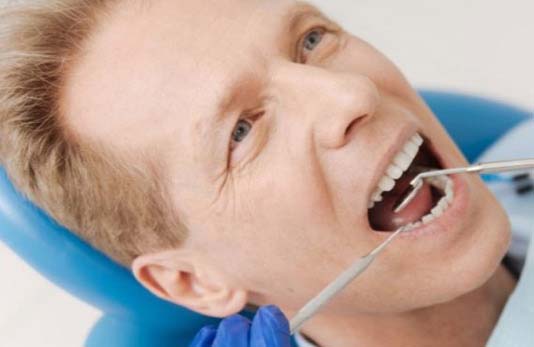4 steps to maintaining a healthy mouth with an autoimmune condition

If you’ve been diagnosed with an autoimmune condition, your oral health isn’t always your first thought in mind.
But just as autoimmune conditions affect your overall health, they affect your dental health, too. Here are four steps you can take to help protect your mouth if you have an autoimmune condition.
1. See your dentist
If you’re living with an autoimmune condition, your dentist is an important part of your medical care team.
Your dentist and hygienist help you stay up to date with:
- Cleanings. If you have an autoimmune condition, you should plan to see your dentist more often than the typical schedule of once every six months. Quarterly cleanings may be necessary to prevent cavities and gum disease.
- Exams. With regular exams, your dentist identifies the signs of oral health problems before they become more serious.
- Medication. A dentist can also prescribe medications to help you manage some of the oral manifestations of autoimmune conditions, such as ulcers or mouth sores.
Make sure your dentist and hygienist are aware of your condition so that they can help determine your best scheduling options and provide you with optimal care.
2. Keep up a strong home routine
Autoimmune conditions increase your risk of oral health problems like tooth decay and gum disease. Committing to good, regular oral hygiene habits at home is important.
Remove plaque by brushing at least twice a day and flossing at least once a day to help fight the increased risk for dental problems.
When brushing and flossing are difficult
Some autoimmune conditions make the act of brushing and flossing difficult. Whether your condition affects your central nervous system like multiple sclerosis or your joints like rheumatoid arthritis, it can make movement more challenging. Temporomandibular joint disorder (TMJ), which can be a symptom of some autoimmune conditions, affects your jaw and can make it harder to open your mouth.
If your symptoms make brushing difficult, be sure to discuss these issues with your dentist and your physician. Your health care team may suggest treatments such as pain relievers, anti-inflammatories, oral splints, mouthguards or corticosteroid injections.
Talk to your dentist about brushing and flossing techniques that may suit your needs. Here are some simple remedies that could help with your oral health care routine at home:
- Use an electric toothbrush. Most electric toothbrushes have larger, wider handles than standard toothbrushes, and they can do some of the brushing motion for you. If you have an autoimmune condition that’s affecting your ability to manipulate a toothbrush, you may find an electric toothbrush easier to manipulate.
- Try a padded grip. Wrap foam around your toothbrush to help create a better grip for daily brushing. Most major online retailers sell special padding grips that can be used for toothbrushes and flosser picks.
- Use a hand-held flosser. Flossing can present special challenges for those with joint pain or dexterity issues. Hand-held flossers range in size from the small “interdental” flossers to flossers with disposable tips and long handles that can accommodate a padded grip.
- Wear a weighted glove. A weighted glove can help reduce trembling and steady hand movements while brushing.
- Sit while brushing. Bring a chair into the bathroom if you need more help while brushing your teeth. Sitting while brushing lets you rest an elbow on the counter for support and stability.
3. Stay hydrated to fight dry mouth
Dry mouth is a symptom of many autoimmune conditions. Your saliva helps to rinse the teeth and control bacteria population in the mouth, so less of it means you’re more prone to tooth decay and other oral health issues. Over time, dry mouth leads to problems for your teeth and gums.
The most important weapons in the fight against dry mouth are:
- Hydration. Drink plenty of water so that your body can produce saliva.
- Stimulation of natural saliva production. Stimulate saliva by chewing sugar-free gum between meals
- Salivary replacements. Replace saliva by using lubricating gels and sprays to coat the inside of a dry mouth.
If you’re experiencing dry mouth, be sure to discuss your symptoms with your dentist.
4. Eat healthy, live healthy
A diet that fights inflammation may help reduce the inflammatory responses associated with autoimmune conditions. An anti-inflammatory diet typically limits processed meats, saturated fat, refined sugars, salt and white flour while including plenty of whole grains, leafy green vegetables, berries, olive oil, beans, green tea, nuts, fish and poultry.
An autoimmune protocol (AIP) diet is a very restrictive diet that focuses on eliminating all inflammatory foods for 30 to 90 days. Foods are then slowly reintroduced back into the diet one at a time to see how the body responds.
If you have an autoimmune condition, you may benefit from the guidance of a registered dietitian. Along with diet, you should incorporate other healthy lifestyle choices that positively impact your body’s immune response, such as practicing stress reduction, quitting smoking, exercising regularly and getting enough sleep.
Last updated December 1, 2022
Related articles:
The oral health information on this website is intended for educational purposes only. Always consult a licensed dentist or other qualified health care professional for any questions concerning your oral health.


